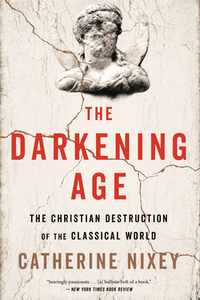You need to sign in or sign up before continuing.
Take a photo of a barcode or cover
262 reviews for:
The Darkening Age: The Christian Destruction of the Classical World
Catherine Nixey
262 reviews for:
The Darkening Age: The Christian Destruction of the Classical World
Catherine Nixey
informative
reflective
medium-paced
Really interesting look into how Christianity developed from the religion of slaves
Easy to read but the author seems to have a penchant to make the same point repeatedly which is boring.
Nixey's pop history purports to present some kind of new perspective on the transition from the pagan Roman world to the dominance of Christianity, but all we get is dusty old Edward Gibbon rehashed for the post-Dawkins/Hitchens age. In the hands of skilled historian this could have been an interesting book; one which explains a fascinating period and an interesting subject. A balanced and objective scholar could have made it clear that this transition was sometimes violent and that the Christians were not the meek lambs of pious legend or Hollywood sword and sandal movies, while still maintaining objectivity and fairness to the evidence. But Nixey is a journalist, not a historian, and so what we get is blunt polemic, warped depictions of events, cherry-picked evidence and blatant distortions, all driven, it seems, by some clear biases.
Nixey has a story to tell and she does not let things like nuance, debate, counter-arguments or even contrary evidence get in her way. She is artfully selective about what she tells her readers and very good at twisting even that to suit her polemical purpose. Her story has "good guys" (the pagans) and "bad guys" (the Christians), and she makes sure she picks the evidence that supports those blunt caricatures and leaves out anything that doesn't. So, in her telling, the great temple of Serapis was destroyed by a wicked mob of Christian fanatics. Though she completely neglects to mention the temple was the base for a gang of pagan terrorists, that they were kidnapping torturing and crucifying Christian victims there, that this had led to a siege involving imperial troops and that the emperor intervened, ruling the murderers could escape but that the temple had to be torn down. *That* changes the entire episode, but Nixey decided not to let her readers know about any of it. And her book is full of this kind of omission.
She downplays the previous pagan persecutions of Christians to try to prop up her idea that the Romans were "tolerant". But to do this she has to resort to long rejected claims by Dodwell (from 1684!) and Gibbon (from 1776!) and then misstates a reference by W.H.C. Frend. She paints a picture of widespread destruction of temples and pagan shrines, but does not consult the latest archaeological surveys that, in fact, show that these events were extremely rare. She quotes Christian writers who condemned classical learning repeatedly and at length, but totally fails to note the other Christian authorities who pushed for Greek and Roman learning to be preserved and studied - a glaring omission, given that the latter *won the argument* about the value of these works.
Over and over again, her thesis depends on selective presentation of evidence, evasion of counter-examples, dismissal of alternative views, misrepresentation of information or overstatement of an idea. As a result of all these shifty tactics, her book has won praise from people with little grasp of the period or the relevant source material, but is being condemned by historians who specialise in the field. Leading expert in Late Antiquity, Dame Averil Cameron, has called Nixey's book "a travesty". And it is. This is a terrible book.
Read my full, detailed critique here: https://historyforatheists.com/2017/11/review-catherine-nixey-the-darkening-age/
Nixey has a story to tell and she does not let things like nuance, debate, counter-arguments or even contrary evidence get in her way. She is artfully selective about what she tells her readers and very good at twisting even that to suit her polemical purpose. Her story has "good guys" (the pagans) and "bad guys" (the Christians), and she makes sure she picks the evidence that supports those blunt caricatures and leaves out anything that doesn't. So, in her telling, the great temple of Serapis was destroyed by a wicked mob of Christian fanatics. Though she completely neglects to mention the temple was the base for a gang of pagan terrorists, that they were kidnapping torturing and crucifying Christian victims there, that this had led to a siege involving imperial troops and that the emperor intervened, ruling the murderers could escape but that the temple had to be torn down. *That* changes the entire episode, but Nixey decided not to let her readers know about any of it. And her book is full of this kind of omission.
She downplays the previous pagan persecutions of Christians to try to prop up her idea that the Romans were "tolerant". But to do this she has to resort to long rejected claims by Dodwell (from 1684!) and Gibbon (from 1776!) and then misstates a reference by W.H.C. Frend. She paints a picture of widespread destruction of temples and pagan shrines, but does not consult the latest archaeological surveys that, in fact, show that these events were extremely rare. She quotes Christian writers who condemned classical learning repeatedly and at length, but totally fails to note the other Christian authorities who pushed for Greek and Roman learning to be preserved and studied - a glaring omission, given that the latter *won the argument* about the value of these works.
Over and over again, her thesis depends on selective presentation of evidence, evasion of counter-examples, dismissal of alternative views, misrepresentation of information or overstatement of an idea. As a result of all these shifty tactics, her book has won praise from people with little grasp of the period or the relevant source material, but is being condemned by historians who specialise in the field. Leading expert in Late Antiquity, Dame Averil Cameron, has called Nixey's book "a travesty". And it is. This is a terrible book.
Read my full, detailed critique here: https://historyforatheists.com/2017/11/review-catherine-nixey-the-darkening-age/
A really excellent book about the origins of the Dark Ages in not just the fall of the Roman Empire but in the rise of Christianity, which actively served as an anti-intellectual, anti-science, and anti-progressive force in Western civilization.
A litany of horrors caused by religious intolerance, but no real analysis. Fails to give any of the larger social, political, and economic context around the rise of Christianity and treats 400 years of history as a single block. Just not what I was looking for, I guess.
Graphic: Animal cruelty, Misogyny, Suicide, Violence, Religious bigotry, Fire/Fire injury, Classism
A fascinating read. I only hesitated to give it five stars because the structure was somewhat weak. There wasn't a clear one and the author occasionally wandered off into repetitive polemic. But the history was fascinating and well-researched.
I'm not sure if my expectations is to blame, but, the book -regardless of how accurate the events are- suffers greatly from repetitiveness and solely reciting events. Maybe, this works for article, but not a book. Christians/Christianity can be all bad and pagans are all good, especially when monotheism inherent rigidity brings rejections to the other. But, there's nothing interesting about that. Why did Christianity emerge? Why did it emerge this way? Where's the appeal?. Forced conversion happens throughout history, but, it's no explanation, religion just doesn't work this way.
I'm afraid the book intentionally or unintentionally perpetuates the new-ashiest idea of treating religions are divine/cursed while rejecting it.
I'm afraid the book intentionally or unintentionally perpetuates the new-ashiest idea of treating religions are divine/cursed while rejecting it.
This book seems to have stirred up some controversy, with Nixey being accused of doing a hatchet job on early Christians. But her clearly stated aim at the start was to counter the view that there was some sort of relatively benign and peaceful transition from the previous pagan beliefs to a uniform Christianity, so her focus is not unreasonable. She’s certainly got plenty of historical evidence on her side too, as she presents a horrifying story of the destruction of great architecture, the burning of books, and the suppression of freethinking and the long ancient tradition of philosophy. Top that off with the violent, murderous elimination of any opposition to Christianity and a repressive attitude to sex (or anything else that might prove pleasurable), the later of which continues to this day, a grim picture of fanaticism and intolerance in the early church is painted. Those truly were the start of the Dark Ages.
dark
reflective
sad
medium-paced
Great book! There were so many times I made a side note to go and look something up at a later time. Also refreshing to hear a different side to history other than what was taught in public school.






